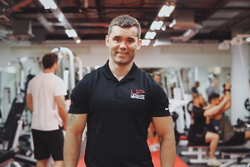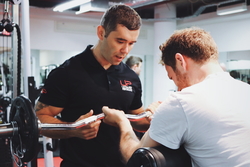From Para to elite Personal Trainer
Category: Success Stories
Publish date: 26/07/2019

Former Para Glenn Parker could have never envisaged a life after the Armed Forces. Glenn had mapped out a 22-year career in the military the day he made the grade for the 3rd Battalion Parachute Regiment. But his vision of a glittering career was shattered when he was medically discharged after suffering a serious head injury which left him with severe epilepsy.
Technically classed as disabled and now with no career path ahead of him, Glenn was at a low point in life. Just as fitness got him into 3 PARA, it was fitness that proved to be the path to his second career as a world-class personal trainer with
Ultimate Performance.
Glenn underwent a gruelling 15-week transformation over a decade ago with Nick Mitchell, one of the world’s leading personal trainers when U.P. was just starting out in London. Since then, Glenn has grown his career as a personal trainer and helped U.P. expand across four continents of the globe and is a veteran among the 250-strong elite training team.
Glenn talks about making the transition to personal training, working, learning and developing within a world-class team of trainers, and how U.P. offers a genuine career path and prospects to former military personnel.
Can you explain a bit about your background and time in the forces?
I joined the ‘Army’ at 16 years 9 months - actually I went to the Army Foundation College in the year 1999.
I was not a fully-fledged soldier until I completed one year of student training. My strengths started to show, which was my fitness and I was constantly winning the Basic Military Fitness test, which incorporates a 1.5-mile run.
It was not until the end of my training at the AFC and my platoon sergeant, who was a member of ‘The Parachute Regiment,’ was someone who inspired me, so I wanted to take a shot with the Paras.
In my Phase 2 training, I completed P-Company which is, 1 week’s physical selection training – you either pass or fail. It was not a high pass rate.
I then completed my jumps course at RAF Brize Norton and them was posted with 3 Para and 16th Air Assault Brigade.
How did you make the switch from a career in the forces to working as a personal trainer?
I was medically discharged from the Army after an assault which left me with epilepsy.
I had a bad incident. I was on exercise and it was domestic leave. I was viciously and aggressively assaulted by a handful of guys. I stopped breathing and I was very lucky that there was an able person there who performed CPR waiting for the ambulance to come.
I had an operation called a craniotomy which was the removal of the frontal lobes of my skull because my head was swelling. I was in a coma for two weeks.
Unfortunately, at the end of that coma, I became epileptic and I had to start phenytoin which was an anti-epileptic medication.
At the time, I had planned to spend 22 years in the British Army. I wanted to make a career out of it. Then suddenly I was classed as technically disabled, I was epileptic, I couldn’t drive for a year because that’s how long you have to be seizure-free.
My most scary thing was what was I going to be doing now with my life? Where was my career going to take me?
Fitness training was my number 1 passion. I was proud, I had hunger and I had desire; I needed to find a way – I needed to ask for help. That’s when I came to Nick Mitchell.
How did you find out about U.P. and what attracted you to the company and made you want to start a career there?
As you know, I was the first ever U.P. Trainer and Nick Mitchell inspired me and I wanted to work for him.
I came to Nick Mitchell and we discussed my goals and discussed my problems with him. He set me a plan to do a 15-week transformation.
I said, ‘right, I’m going to be trained here by one of the best personal trainers in the world. What I am going to do? I’m going to give everything to this transformation! I’m going to give this a ‘do-or-die-trying attitude’ because if I had never met Nick and he had never given me that transformation purpose, I would have just led a mediocre life.
People at the end of the transformation in the outside world saw a drastic, fast, physical and aesthetic change.
But me, I saw it differently. U.P. helped me clear a path of whatever obstacle I had in my way.
I had such a clouded judgement of where I was going. U.P. helped me move forward through that.
The lessons I learned mainly about myself during the transformation, were it taught me that with correct programming and correct guidance, I can move forward and I can do anything. I can achieve anything I’m physically capable of doing.
Which skills from forces life have really transferred to your career at U.P.?
The skills the forces have taught me to enable to transfer over to civilian life are communication skills which have enabled me to pursue client communication.
Flexibility, because the job of a PT is not 9-5pm
Teamwork which was the essence of being in the forces, plus an organisation of any kind.
Planning skills, well you need to create an effective training and nutrition plan, appointments, bookings that work around the busy schedules of our clients.
Problem-solving skills, how to help, advise and communicate to a client when things are not going as planned to help them achieve the best results possible.
What have been your proudest moments working for UP?
- Being recognised as a person who has inspired people to change their lives and start to PT (15 Week Transformation)
- Having the opportunity to use my skills and change people for the better.
- Being able to tell my story to help others, not just in the fitness world.
What would your advice be to anyone else transitioning out of the forces and wanting a career path as a trainer?
Of all the juniors I have seen, just go for it and apply. Once you have passed the first hurdle, there is absolutely no better place to get smarter, get fitter and stronger, and become a better trainer. Be a part of the U.P. team which is the best in the world.
What are the qualities of military personnel that translate well to personal training to make an effective PT?

Ex-military personnel have the advantage of several key skills that can translate into an effective Personal Trainer. I will list 5. Not in order of priority: - Hard work- Within the military you will understand the importance of hard work, in performing the role at a high standard.
- Human Relationships/Communication Skills- Whatever position you are in, it is vital to understand your team/comrades, which is built within training and working together.Also vital to understand the people you are dealing with when in situations such as combat.
- Fitness- This goes without saying.
- Compassion and Understanding- Within the military, you will meet all types of different personalities, and some you will have to deal with in a supportive manner.
- Inspiration/ Motivation/Resilience - When military training you will need to motivate each other to get through the particular course. Especially at times when you feel like just packing it in and stopping
Click below see U.P. Fitness range national and international roles on RightJob: